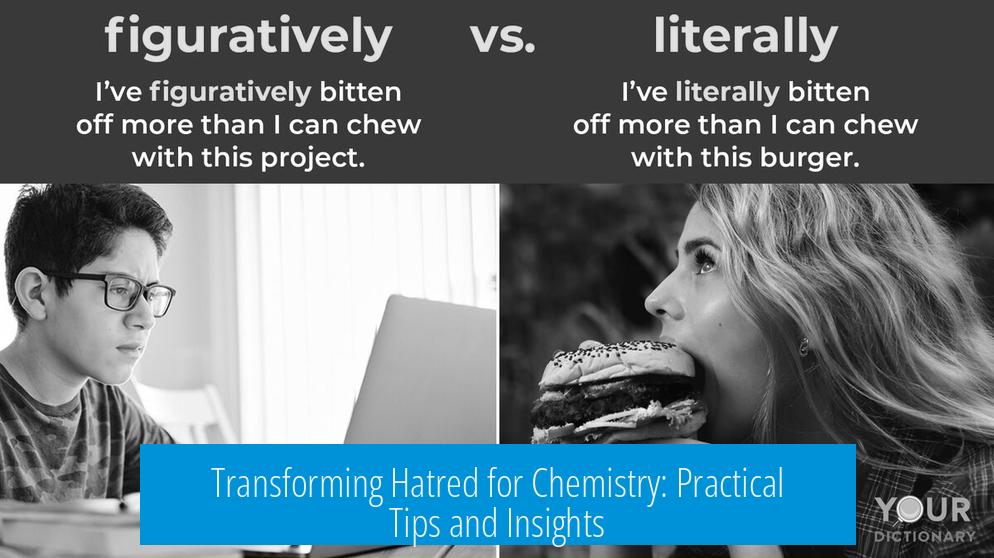I Literally Hate Chemistry, Any Advice?

The best advice for someone who hates chemistry is to shift their mindset: approach chemistry as an opportunity to learn and understand the world, relate it to everyday life, use engaging resources, and find personal meaning in the subject. Accept that some parts of chemistry may feel dull but pushing through can reveal deeper interest and relevance.
Changing Your Perspective Toward Chemistry
Many students struggle with chemistry because they see it as a forced obligation. Changing this view can help significantly.
See Chemistry as Learning, Not a Burden
- Stop thinking of chemistry as something you “have to” study.
- Instead, consider it as learning something new and valuable.
- This mindset can make studying less stressful and more engaging.
When you view chemistry as a chance to grow your knowledge, you may discover whether you actually enjoy or want to pursue it further.
Use Chemistry as a Tool to Understand Reality
Chemistry lets you explore how the world works on a fundamental level. Asking questions like “How is this made?” or “Why does it behave this way?” sparks curiosity.
- Learning theoretical concepts alongside their real-world applications helps connect textbook material to everyday objects.
- For example, analyze what materials are in tires, bedding, or electronics.
This approach can make chemistry feel more purposeful and interesting.
Accept That Some Content Is Unavoidable

Some topics in chemistry might seem boring or difficult, especially in introductory courses.
- Patience is key; the subject often becomes more exciting in advanced classes.
- For example, many students find analytical chemistry more engaging than general chemistry.
Digging deeper into areas of personal or professional interest often ignites passion.
Engage Practically and Connect to Real Life
Try Safe At-Home Experiments
Hands-on activities help transform abstract concepts into concrete experience.
- Conduct simple experiments using common household items.
- Observe chemical reactions safely, like vinegar reacting with baking soda.
Practical work makes chemistry tactile and less intimidating.
Relate Chemistry to Everyday Things
Chemistry is everywhere—from cleaning products to cooking ingredients.
- Explore chemicals in roach spray, shampoo, or food additives through online resources.
- Understand why acids tenderize meat or how sodium affects baking.
- Stay curious about how things work chemically in daily life.
Link Chemistry to Personal Interests
Integrate chemistry concepts with hobbies.
- If you enjoy cooking, examine chemical changes during baking.
- If technology interests you, look into materials science aspects of gadgets.
Connecting chemistry to your passions makes it more relevant and enjoyable.
Use Media and Alternative Resources
Watch Shows or Series Featuring Chemistry
TV shows with chemistry themes can spark interest in the subject.
- Students mention that watching “Breaking Bad” kept them engaged.
- Such media dramatize chemistry in intriguing ways.
Explore Educational YouTube Channels
Channels like Veritasium present science in clear, engaging formats.
- Short videos explain complex topics simply.
- This format suits visual and auditory learners well.
Learn the History Behind Chemistry Discoveries
Understanding the stories of scientists provides context.
- Discover how chemical concepts were developed amid challenges.
- This approach humanizes chemistry and relates it to problem-solving.
- YouTube offers many videos themed around history and discovery narratives.
Find Personal Meaning and Motivation
Link Chemistry to Future Goals
A solid foundation in chemistry can help in diverse careers.
- Even if you dislike chemistry now, consider it a stepping stone.
- Reflect on how chemistry might support what you want to achieve.
Distinguish Between Chemistry and Specific Courses
Sometimes a particular class is challenging, but chemistry itself is broader.
Separating “chemical knowledge” from a tough class experience helps reduce frustration.
Personalize or Romanticize Your Experience
Some students find adding music or a comfortable study routine improves their attitude toward chemistry.
Accept It Might Not Be for Everyone
Recognize that chemistry is not suited to every individual, just like other professions.
This recognition reduces guilt and helps focus on finding your niche.
Shared Experiences and Encouragement
Many people struggle with chemistry.
Experienced professionals and students empathize and offer support.
Persistence often leads to improvement and discovery of interest.
Key Takeaways
- Shift mindset: learn chemistry as understanding the world, not just a requirement.
- Connect chemistry to daily life and personal interests for relevance.
- Use practical experiments and media to engage actively.
- Be patient; some topics are boring but explore deeper for more exciting areas.
- Accept chemistry may not be for all, but foundational knowledge supports many goals.
Q: How can I start seeing chemistry as less of a chore and more interesting?
Try to see chemistry as learning something new rather than a forced task. Spend time studying with a fresh mindset. This can help you find parts that actually grab your attention.
Q: Any tips to relate chemistry to daily life to make it easier?
Look at everyday items like shampoo or cooking ingredients and learn their chemical makeup. This helps connect chemistry to things you experience daily and sparks curiosity.
Q: How can media help me enjoy studying chemistry?
Watch shows like Breaking Bad or educational channels like Veritasium on YouTube. These add excitement and real-world context to chemistry concepts.
Q: What should I do if some chemistry topics feel boring or too hard?
Accept that some parts will be dull, especially early on. Keep going; many find their interest grows with deeper study or more advanced topics.
Q: How do I find motivation if I really dislike chemistry?
Think of chemistry as a step related to your goals, not the goal itself. Focus on what you like and see chemistry as a necessary hurdle to get there.





Leave a Comment